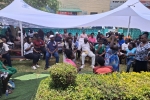By Fanwell Chinowaita
Prosecutor General Kumbirai Hodzi has said cartels are difficult to deal with for they have captured state institutions.
Hodzi said, "It is difficult to deal with cartels because of their stranglehold on key State institutions such as the judiciary, the media, the Zimbabwe Anti[1]Corruption Commission, the police and political parties."
Hodzi's acknowledgement has since caught the ire of many Zimbabweans who are suffering as a resulting of corrupt individuals and entities holding the country at ransom. The PG's sentiments were castigated by MDC Deputy Spokesperson Luke Tamborinyoka, who in his statement said; "Hodzi, who is mandated to prosecute crimes in the country, said that it is difficult to deal with cartels because of their stranglehold on key state institutions.
That the country's PG would make such revelations exposes the octopus links that the criminal cartels have on State institutions, key among them the country's Presidium,” he said.
He added that Hodzi's revelation laid bare the lies by the ruling Zanu PF party that the country's problems were a result of sanctions.
"While Zanu PF has gone hoarse lying to the world that sanctions are the problem in the country, recent revelations by Zanu PF senior officials, including the startling admission by the PG himself, have exposed the fact that at the heart of the country's rot is the unbridled culture of sleaze, avarice and corruption by the well-heeled and the politically connected. The Prosecutor-General has unwittingly revealed his impotence because of the intricate web of connections that these cartels have, including with the judiciary. It was lost on Hodzi that as an officer of the court, he was also implicating himself through his revelation that the judiciary is part of this festering rot", Tamborinyoka said.
Cartels are people who are fingered in gross corruption which is crippling the economy of Zimbabwe. Recently, Zanu PF suspended Youth League Deputy Secretary Lewis Matutu and Political Commissar Godfrey Tsenengamu for holding a press conference exposing saying Kudakwashe Tagwirei, Tafadzwa Musarara and others are the cartels who are working with some government officials to cripple Zimbabwe's economy.
Zimbabwe is said to be losing US$1 billion every year to corruption, according to anti-graft watchdog , Transparency International but Hodzi, who was appointed by President Emmerson Mnangagwa in July 2018, laid the blame on the growing sophistication of cartels which he said were responsible for most of the high-level corruption.
“The nature of the cartels cuts across all the institutions, media, legal profession, judiciary, National Prosecuting Authority and all other institution that are mandated to fight corruption, even members of the public and businesspeople, they are also involved in these cartels,” he had earlier told participants at a Political Actors Dialogue (Polad) economic thematic committee capacity-building workshop in Bulawayo.
“The cartels are well organised, they are organised in the sense that their organisation is deliberate and meant to frustrate the discovery of their corruption. They make sure they are not discovered and frustrate the prosecution and the work of law agents,” Hodzi said.
“They are taking advantage of the technological advancement in the society and we need to up our game and have a cyber-forensic laboratory. We need to change our laws which will allow cyber as evidence and everybody needs to understand the computer-based transactions,” he said.
There have not been any meaningful prosecutions on corruption since Mnangagwa who took over from Mugabe promised to deal decisively with corrupt elements. When he came into power, Mnangagwa fired the Zimbabwe Anti-Corruption Commission commissioners and replaced them, raising hopes but nothing tangible has been achieved so far. In August last year, Mnangagwa fired Priscah Mupfumira, who was then Tourism minister after she was charged with corruption involving $95 million. Her case is still dragging in the courts.








Leave a comment